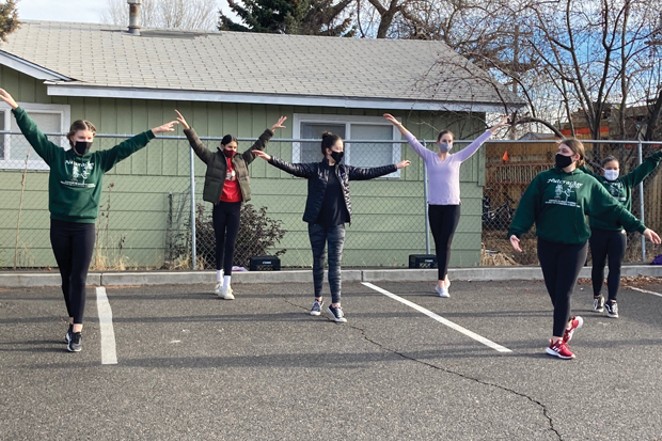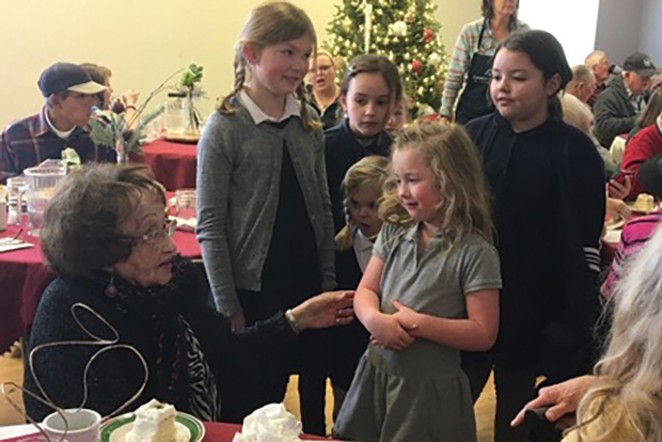"Inter-generational interaction is the best gift we can give, to the young and to the old."
That's the advice of Central Oregon's Council on Aging communications director Denise Labuda for anyone looking for a way to reach out this holiday season. "That inter-generational connection is hard to keep alive right now because of COVID," she says. "There's still this reality that we're not all going to have family to take care of us or live near our families."
Starting with the younger generation is important, Labuda emphasizes. "If we start young, if we teach kids to help older people who are not their grandparents, then as they grow, hopefully they will be more open to it." By the same token, she suggests, if anyone is retired and has time to volunteer, "why not go and be a mentor in a high school class? We don't have that in the high school curriculum now, but wouldn't it be wonderful?"
Headquartered in Bend for the Central Oregon area, the Council on Aging offers a myriad of free services for anyone age 65 or older, from legal advice concerning age discrimination at work, to free meal delivery regardless of financial need. "Meals on Wheels is a mobility-based program, nothing to do with a person's income," Labuda explains. "Maybe you can't stand and cook, maybe you can't carry groceries or drive a car to get to the store." The need is sometimes short term, for example when a person is recovering from knee surgery, or may be longer term if they are simply no longer driving, she explains.
Labuda points out that more and more of our population is 65 or older. In Deschutes County, for example, that number is currently over 20 percent. "By 2035 it will be 25 percent," she says. "In Jefferson and Crook Counties, they are already at one in four, and by 2035 they will be at one in three. It's a huge shift, and it's happening everywhere." Labuda says resources like Social Security and even Area Agencies on Aging, the council's funding source, are not keeping pace with the increasing need.
"These changes have implications across housing, transportation and public spaces," Labuda says. "We know that to be healthy through aging is about being connected, as well as living in a safe community. That includes sidewalks, transportation, and (eliminating) trip hazards," she says. "Go to an average park today and you'll see areas for children, maybe walking paths— which aren't necessarily smooth (for walkers or wheelchairs)—and you may be lucky enough to find only one or two places to sit in the entire park."
The Council reaches out to help seniors in a variety of ways, though some services are currently suspended due to COVID. "There are (school) classrooms making greeting cards and decorating bags for the meals we deliver," she says. "In-person dining has been suspended, but in the past, we've had children come and sing during meals or do art projects where seniors are dining."
The council is funded by the AAA, which in turn receives federal dollars, based on the Older Americans Act of 1965 – but unfortunately, the program hasn't kept up with the growing need, Labuda says. "It's been kicked down the road for the last 40 years. Sometimes we do cap out." The funds are considered seed money, she explains. "We are to help start covering program costs, but it is presumed, and assumed, that the community will meet the other portion. That was arguably a good concept back in 1965, but not very effective in 2021. For example, we may only get half the cost of a Meals on Wheels program. In Madras, managing Jefferson County, the senior center there will staff the MOW program, but then they have to find the remaining funding."
During the holidays and at other times, groups of kids and families can easily find ways to plug in. "Our volunteer manager works with schools and other groups locally. If there are any organizations that have an interest in doing things like making cards or making little gifts for the holidays, we're happy to connect them with the seniors," Labuda says.
To find out more about the services available through the Council on Aging, including evidence-based mobility and balance exercise classes, social support, help navigating Medicare or caregiver support resources or to explore volunteer opportunities like phoning a senior once a week or training for nutrition or assessment programs, visit the website at councilonaging.org.









